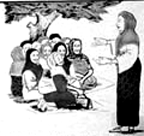Organize the Community for Action
| STEPS |
|---|
|
STEP 2: Build trust, credibility and a sense of ownership with the community.

It’s important for you and your team to take time to establish trust and credibility in the community and develop ownership of the CM effort among community members. To these ends, field workers have typically used strategies like the following:
- Identify an activity that community members enjoy, such as a sporting event, knitting circle, or community fair, and work with the community to help organize the activity. The activity may or may not have anything to do with your health issue.
- Establish meeting times and places based on community members’ availability and local calendars, taking planting and harvesting into account, for example, and having meeting at times when most people are available (weekends, afternoons, or evenings).
- Encourage participants at every meeting to keep what is said in the group confidential and make sure that it remains confidential outside of the group if this is important to participants. This may be particularly important when discussing reproductive and sexual health practices and other sensitive issues.
- Help to create safe spaces in which participants can express themselves freely by validating participants’ feelings, respecting differences of opinion, and assisting groups to prevent conflict or resolve conflict when necessary.
- Be honest and transparent.
- Ensure that all members of your team communicate consistently with community members, which means all team members need to embrace the program philosophy, be well informed about program activities, and be able to explain them to community members. Inconsistency in team members’ communication quickly translates into community confusion and distrust.
- Call community members’ attention to times when they do not fulfill their promises and commitments, in a respectful way that promotes reflection and fosters greater accountability.
- Apologize and accept responsibility when mistakes are made or promises are broken.
- Learn about and accept where community individuals and groups are in their own development, skills, knowledge, and organization and build on their strengths—rather than starting from where you may assume or think they should be. Exercises in getting to know one another and learning about the world in which each of us lives are helpful to demonstrate how context and experience shape our attitudes and behavior. They can also help develop a sense of empathy and compassion.
     
|